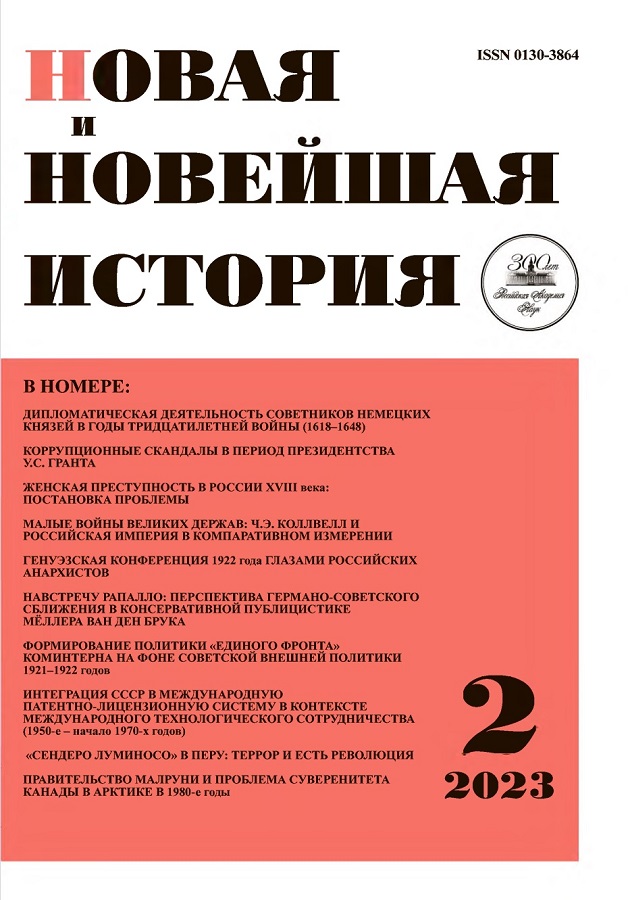The Mulroney Government and the Problem of Sovereignty of Canada in the Arctic in 1980s
- Autores: Volodin D.A.1
-
Afiliações:
- Institute for the U.S. and Canadian Studies, RAS
- Edição: Nº 2 (2023)
- Páginas: 149-161
- Seção: 20th century
- URL: https://snv63.ru/0130-3864/article/view/671060
- DOI: https://doi.org/10.31857/S013038640022011-0
- ID: 671060
Citar
Texto integral
Resumo
The Mulroney Government's decision to draw direct baselines around the Canadian Arctic Archipelago and explicitly assert Canadian sovereignty over these waters marked a move away from a functional approach that was aimed merely to increase Canadian control over shipping in these waters. From that time onwards, the straight baseline method has been a key element in the justification for Canadian sovereignty over the waters of the Canadian Arctic Archipelago. As the largest Arctic power with similar positions on some Arctic issues (the legal status of the Northwest Passage and the Northern Sea Route) and a potential field of conflict of interest (the continental shelf), it is crucial for Russia to understand the nuances of Canada's position regarding its sovereignty over various types of space in the Arctic (land, sea space, continental shelf). The article draws on a wide range of sources: transcripts of debates in the House of Commons; news articles; ministerial documents and statements by their leaders; and the memoirs of Prime Minister Brian Mulroney. Significant among the sources are articles by Canadian lawyers of the time who substantiated the benefits for Canada of using the straight baseline method to justify its sovereignty in the Arctic. The author concludes that the measures taken by the Mulroney Government are important for the international recognition of Canadian sovereignty over the waters of the Canadian Arctic Archipelago.
Palavras-chave
Sobre autores
Dmitry Volodin
Institute for the U.S. and Canadian Studies, RASRussian Federation, Moscow
Bibliografia
- Авраменко И.М. Международное морское право. М., 2003.
- Володин Д.А. Канада и проблема суверенитета в Арктике в 1950–1960-е годы: от суверенитета над сушей к суверенитету над морским пространством // США & Канада: экономика, политика, культура. 2021. № 9. С. 114–126.
- Володин Д.А. Канада и кризис «Манхэттена» в Арктике (1968–1970 гг.) // Россия и Америка в XXI веке. 2021. № 4. URL: https://rusus.jes.su/s207054760017795-1-1/ (дата обращения: 14.09.2022).
- Коренное население Северной Америки в современном мире / отв. ред. В.А. Тишков. М., 1990.
- Максимова Д.Д., Соколов В.И. Север и Арктика в политике и хозяйстве Канады. М., 2015.
- Соков И.А. Проблемы высокой Арктики и их разрешение в контексте политической культуры современной Канады // Россия и Канада: арктические гиганты. Материалы Седьмых Канадских чтений / отв. ред. Ю.Г. Акимов, К.В. Минкова. СПб., 2019. С. 152–176.
- Canada. House of Commons Debates. Official Report. 33th Parl. 1st Sess. Vol. IV. Ottawa, 1985.
- Canada – United States Agreement on Arctic Cooperation and Exchange of Notes Concerning Transit of Northwest Passage // International Legal Materials, Vol. 28. № 1. 1989. P. 141–145.
- Challenge and Commitment. A Defence Policy for Canada. Ottawa, 1987.
- Documents on Canadian Maritime Sovereignty, 1950–1988 / ed. A. Lajeunesse. Calgary, 2018.
- Kirkey Ch. Smoothing Troubled Waters: The 1988 Canada-United States Arctic Co-operation Agreement // International Journal. 1995. Vol. 50. Iss. 2. P. 401–426.
- McDorman T. In the Wake of the “Polar Sea”: Canadian Jurisdiction and the Northwest Passage // Les Cahiers de Droit. 1986. № 3. P. 623–645.
- McKinnon B. Arctic Baselines: A Litore ad Litus // Canadian Bar Review. 1987. № 4. P. 790–817.
- McRae D. Arctic Waters and Canadian Sovereignty // International Journal. 1983. Vol. 38. № 3. P. 476–492.
- Mulroney B. Memoirs, 1939–1993. Toronto, 2007.
- Pharand D. Legal Regime of the Arctic: Some Outstanding Issues // International Journal. 1984. Vol. 39. № 4. P. 742–799.
- Roach A., Smith R. Excessive Maritime Claims. Newport, 1994.
Arquivos suplementares










